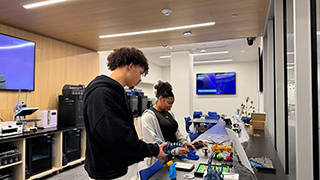Building a Highly Funded Biological Research Program With Global Impact in Mind - Seton Hall University
Tuesday, April 4, 2023

Today, her research group specializes in studying how morphine, a potent opium-based drug, affects the nervous and immune systems. At Seton Hall, Chang is director of the Institute of NeuroImmune Pharmacology (INIP) and Professor of Biological Sciences in the College of Arts and Sciences and Neuroscience in the School of Graduate Medical Education (now the School of Health and Medical Sciences).
In February, the Office of the Provost — as part of its Academies initiative that grants faculty researchers funding to pursue multidisciplinary studies with collaborators from other Seton Hall departments, schools and colleges — awarded Chang three years of funding to launch the Academy for Nature and Nurture: Interdisciplinary Approaches to Resilience. It will combine research, teaching, and service to confront the nationwide mental health and addiction crisis, which in 2021 claimed more than 100,000 lives in the U.S. as a result of drug overdose deaths.
Since arriving at Seton Hall in 1994, Chang has garnered more than $16 million in research funding and authored more than 160 publications reporting new scientific findings and perspectives. She has discovered the biological mechanisms through which morphine suppresses the immune system in animals and humans; developed transgenic rats containing HIV viral proteins to study how opioids affect antiretroviral treatment in people infected with HIV; and most recently has investigated how addictive drugs and alcohol make people more vulnerable to COVID-19 infections.
Her work has had a massive bearing on biological research at Seton Hall. In 2004, she launched Seton Hall's molecular bioscience Ph.D. program, which has seen six Ph.D. students successfully defend their theses and earn their doctoral degrees. She currently has four graduate students actively pursuing doctoral degrees in her lab. Over the years, she has mentored and advised dozens of undergraduate and master's degree students as well.
"Seton Hall has been incredibly supportive of the graduate students in my laboratory, providing tuition awards to match federal funding support for research so students can focus on their scientific pursuits without needing to do T.A. work," she says.
Nearly all Ph.D. programs in the U.S. require students to perform "teaching assistance" work in exchange for tuition reduction and stipends. This work requires them to help professors instruct undergraduates and administer lectures and lab courses.
At INIP, Chang and her team are continuing to do pioneering research that explores how use of morphine and other substances changes interactions between the nervous system and immune system at the molecular, cellular and whole-organism level, and how those changes alter biological functions during normal health and states of disease.
In early 2020, as COVID-19 forced most scientists throughout New Jersey and the U.S. to shutter their labs and shelter at home, Chang's team kept working remotely to analyze genomic information about COVID-19 patients that was made available through online databases.
"We were very lucky, because Seton Hall had just purchased the right bioinformatics tools to allow us to make use of the COVID-19 patient data in these databases," she says. "We took a systemic approach to study how use of addictive substances including alcohol and methamphetamine may make people more susceptible to severe or deadly COVID-19 infections and [alter the course of disease]."
Chang also has authored peer-reviewed publications providing insights for up-and-coming researchers on how they can establish their own labs and earn federal funding as principal investigators on new studies. "You must learn how to work with the system you're in," she says, considering how the core research services and resources that a university offers to its faculty can help convince a federal agency that a funded study will receive the proper support to reach its goals. She has helped review numerous NIH grant applications by serving more than 170 Study Sections at National Institutes of Health.
She is a member of several prestigious professional societies, and she serves as president of the Society of NeuroImmune Pharmacology and as a board member of the International Drug Abuse Research Society. Chang is also a journal editor overseeing the peer-review process at Journal of NeuroVirology, Frontiers Advances in Drug and Alcohol Research, and Journal of NeuroImmune Pharmacology and Therapeutics.
In nearly 30 years of building a formidable biological research pipeline at Seton Hall, Chang has taken three sabbaticals to forge new international collaborations and develop global research perspectives, working in Taiwan as a visiting professor at National Chengchi University and China Medical University. At Seton Hall, her lab and the INIP have welcomed many international students, postdoctoral fellows and visiting researchers.
"I believe in the three 'Gs' of successful research: grant funding, graduate program development and globalization," Chang says. "Seton Hall has been an incredible sponsor and support system for my scientific projects here in New Jersey and around the world – I am very grateful for what I've been able to achieve over my career and I plan to continue expanding the research work that my group and our collaborators are pursuing."
Categories: Health and Medicine, Research, Science and Technology






